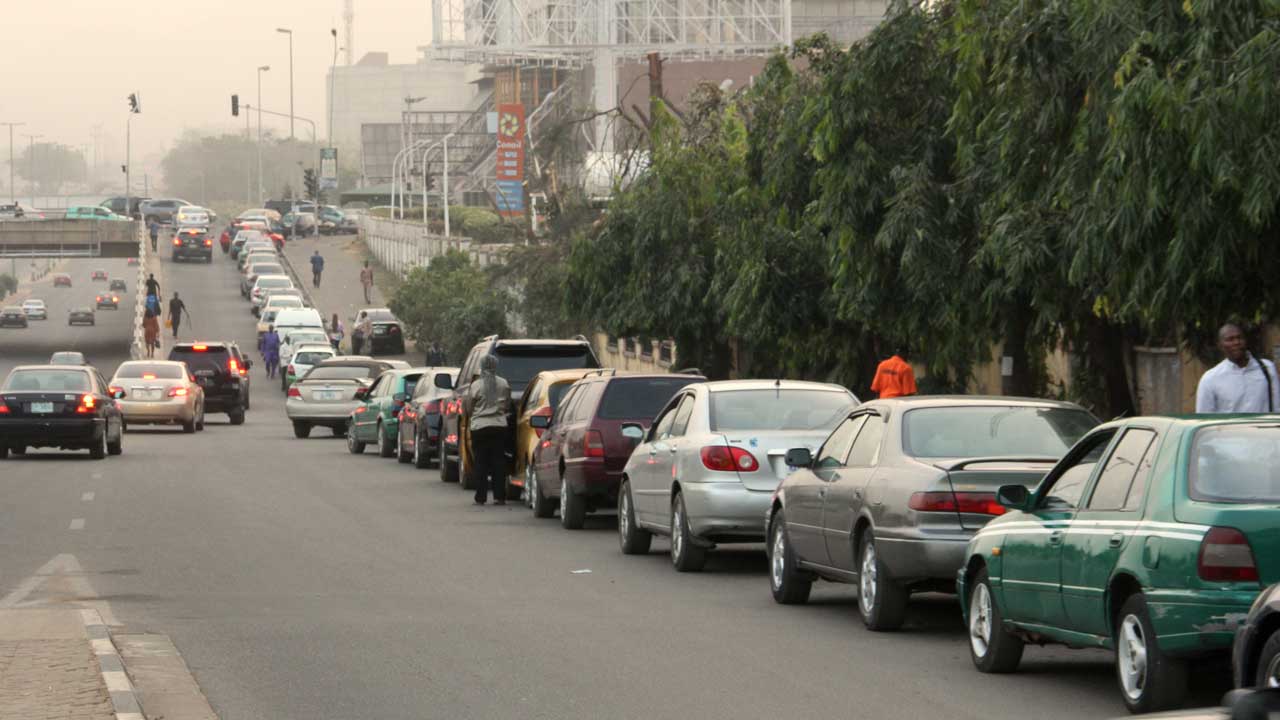• NNPC asks trading firms for emergency petrol supplies as FG battles to restore order
• Queues spread across Nigeria, black marketers sell at N250/litre in Abuja
• NMDPRA, NNPC identify supplier of adulterated fuel, to sanction misdeed
• IPMAN blames NNPC, admits payment of N36b backlog
• Many vehicles to develop engine, drivability problems, experts warn
• Why fleet owners, companies, motorists must take legal actions
Notwithstanding the blame game among industry players on the resurgence of fuel queues in some parts of the country, Nigerians may begin to experience some relief by weekend following claims by regulatory authorities that the adulterated petroleum products in circulation have been contained.
If the claim is true that only 100 million litres of dirty Premium Motor Spirit (PMS) is in circulation, stakeholders in the industry said the situation would be addressed within two days going by the daily consumption volume of the country.
Despite the containment efforts, the damages caused to some vehicle owners and retail stations might take a while to address, as vehicle owners are agitated and considering litigations against the fuel stations, who might equally return the ‘favour’ to the sole importer of the product.
Already, some car owners have parked their cars at filling stations claiming damages, while a few others have threatened lawsuits to get redress.
Indeed, accusing fingers, yesterday, remained in the direction of the nation’s oil company, Nigerian National Petroleum Company (NNPC) Limited, as high sulphur or adulterated petroleum product fuel public health concerns and damages on vehicles across the country.
The Guardian learnt that though sanctions would apply to erring importers, it may not happen until the processes that led to the importation are examined and interrogated.
The Independent Petroleum Marketers Association of Nigeria (IPMAN) admitted yesterday, that over 100 per cent of its products are imported into the country, adding that it has been confirmed that the products across retail outlets are adulterated and are being cleared by the state oil firm.
The Nigerian Midstream and Downstream Petroleum Regulatory Authority (The Authority) also admitted that “limited quantity of PMS, commonly known as petrol, with methanol quantities above Nigeria’s specification was discovered in the supply chain.”
The regulator, which did not list punitive action over the development, noted that the product is being cleared as the limited quantity of the impacted product has been isolated and withdrawn from the market, including loaded trucks in transit.
“Our technical team in conjunction with NNPC Ltd and other industry stakeholders will continue to monitor and ensure quality petroleum products are adequately supplied and distributed nationwide. The source supplier has been identified and further commercial and appropriate actions shall be taken by the Authority and NNPC Ltd,” a statement from the government said.
THIS is as automobile experts are warning fleet owners, especially corporate organisations, haulage companies and car owners to get set for engine-related challenges and drivability problems in their vehicles if fueled with the dirty petrol.
They are also demanding an end to the development, insisting that there is need for a legal suit against fuel importers to halt continuous importation of adulterated fuel into the country.
Although a major oil producer, Nigeria has been unable to run a functional refinery as the assets for over 30 years remained loss-making entities as government controls import of petroleum product, determines the price and pays subsidy to itself.
With the inability to allow a deregulated market and lack of foreign exchange for marketers, NNPC remains the sole importer of the product into the country.
Sadly, while most European countries, where the products are imported from drive their vehicles on less than 10 part per million (ppm), the sulphur content in petroleum products sold in Nigeria is over 300 ppm.
In September 2016, a report launched by Public Eye, a Swiss organisation, which, through its investigations and in-depth research spotlighted ways companies impact disadvantaged populations, revealed the double standard that refiners in Europe employ in their refining processes.
Even though these refiners comply with their extant regulation on dirty fuel, they collaborate with oil marketers in Nigeria and other African countries to ship dirty fuel into the region.
Recall that laboratory analysis conducted in 2020 by an international resource watchdog group, Stakeholder Democracy Network (SDN), again revealed that petroleum products refined by illegal refineries in Niger Delta were indeed cleaner than what marketers import into the country.
The SDN research further showed that imported fuel exceeded European Union (EU) pollution limits by as much as 204 times, and by 43 times the level for gasoline.
Conversely, the research showed that fuel from illegal refineries in Nigeria only exceeded EU sulphur standards 152 times, and 40 times the level for gasoline.
Although NNPC had repeatedly denied importing dirty fuel into the country, the prevailing situation, where the national company is battling to recall adulterated fuel from the market according to stakeholders heighten public health concerns and raise worries on regulatory loopholes.
In other countries, fuel are classified depending on their standard and consumers are allowed to choose between the basic and premium, but the situation is different in Nigeria as the downstream segment of the nation’s petroleum industry struggle to perform under government control.
While the United Nations had held a high-level meeting within the framework of the ECE on the Protection of the Environment and came up with the 1979 Geneva Convention, in terms of air quality, the UN had ranked Nigeria as one of the worst in the world when it comes to fuel sulphur content control.
Officially, the limit set by the Standards Organisation of Nigeria (SON) for fuel sulphur is 150 ppm (petrol). Even though this is still about 15 times higher than the EU standard, marketers find their ways and means to import worst fuel on the backdrop of weak institutional gaps.
These include, dearth of up-to-date fuel testing technologies and equipment, inadequate training and capacity development opportunities and lack of sustained funding incapacitating SON and other agencies to effectively detect, measure, monitor and enforce fuel quality standards.
A vice-president at IPMAN, Abubakar Shettima, said most fuel stations across the country already have the adulterated fuel, adding that it will take days to return to sanity as Petroleum Products Marketing Company Limited (PPMC) continue to increase truck out-of-safe products.
According to him, marketers will work for 24 hours to ensure that queues are cleared in less than two days, particularly those who have the good products.
He said: “100 per cent of the PMS comes through NNPC but I cannot say that they brought the product in with the intention to fill the market with something that is adulterated. There must be something wrong because they have been importing products for a very long time and we have never seen this kind of problem.
“We have invited our consultant to determine the level of the product in the market. As of now, our consultants are still working. Although we own about 99 per cent of petrol stations in the country, we don’t import products but rely on depot owners and NNPC to source our products.”
Shettima disclosed that the government is clearing bridging allowance that would have triggered fuel scarcity, noting that about N36 billion backlogs have already being paid to the marketers.
Founder of Automedics, Kunle Sonaike, told The Guardian that the development might cause serious financial damages to motorists, stressing that dirty fuel is directly linked to engine-related, drive faults.
Sonaike insisted that there is need for citizens to rise against consumption of dirty fuel in the country, stressing that the menace affects the country’s productivity with vehicles not only breaking down easily but also multiplying cost of repair.
While lamenting the inability to fix the nation’s refineries, he advised legal actions by citizens, noting that the multiplier impacts of driving vehicles with dirty fuel should not be accepted.
A professor of Energy and Environmental Law at Afe Babalola University (ABUAD), Damilola Olawuyi, had told The Guardian that dirty fuel importation remained an environmental, social and human rights breaches.
He decried the situation whereby major oil companies get away with the development because stringent air pollution control measures are not in place.
Olawuyi also condemned the dumping of poor quality fuels that cannot be sold in any other country in Nigeria, and the toxic contamination that follows, while faulting the current standard in the country, which allows the importation of petrol with 150 ppm.
MEANWHILE, the NNPC has asked trading firms for emergency supplies of petrol to replace cargoes that were rejected because of their poor quality, two sources with direct knowledge of the matter disclosed to Reuters yesterday.
NNPC was seeking about 500,000 tonnes of gasoline, one of the sources added. The sources spoke on condition of anonymity due to the sensitivity of the matter. NNPC did not immediately respond to requests for comment.
Nigeria depends almost entirely on imports to meet its domestic gasoline needs after many failed initiatives to revamp its dilapidated refineries. Daily gasoline consumption is roughly 40 million litres.
NNPC handles nearly all these imports through crude-for-fuel contracts, known as direct sale, direct purchase (DSDP), with consortia of local and foreign oil firms.
Each consortium receives 20,000 barrels per day (bpd) of crude oil in exchange for products, making the combined total about 320,000 bpd of Nigeria’s output. The country produced about 1.5 million bpd of crude in January.
Queues at petrol stations in Lagos and Abuja grew longer yesterday with motorists struggling to obtain the product. Checks around Abuja, yesterday, showed that only few major marketers sold the product with all independent stations shut.
Expectedly, black marketers had a field day as they sold a litre of petrol at N250.
SOurce: GUardian.ng

















